Many things affect your hair health and how fast it grows. These include your age, overall health, and what you eat. Your genes, exposure to things in the environment, and the medications you take also matter. Vitamins and minerals from your diet are crucial for your hair’s health.
If your diet is missing these important nutrients, you might experience hair loss. Some key vitamins and minerals for healthy hair include vitamin B12, D, biotin, riboflavin, and iron. Eating a well-rounded diet that’s rich in these can improve your hair growth. This is especially true if your hair loss is because you haven’t been eating well.
We do need more research to fully understand how micronutrients and hair loss are connected. However, we already know that eating 13 certain foods is beneficial. These foods are rich in nutrients that support hair growth. So, it’s a good idea to make sure you eat these foods often to keep your hair healthy.
Key Takeaways : Foods For Healthy Hair Growth
- Vitamins and minerals from food play a crucial role in hair follicle growth and cellular turnover.
- Nutrient deficiencies, such as in vitamins B12, D, biotin, riboflavin, and iron, can lead to hair loss.
- Eating a balanced diet rich in hair-strengthening nutrients can help promote healthy hair growth.
- Certain foods like eggs, berries, spinach, and fatty fish are packed with nutrients that support hair health.
- Incorporating a variety of nutrient-dense foods into your diet is key for maintaining strong, healthy hair.
The Importance of Nutrition for Hair Growth
To grow strong hair, you need to eat a balanced diet full of essential nutrients. These vitamins and minerals are key for the hair follicle growth cycle and cellular turnover. Not getting enough of these nutrients can cause hair loss, especially if you lack vitamins B12 and D, biotin, riboflavin, and iron.
Nutrient Deficiencies and Hair Loss
Having a balanced diet with all the necessary vitamins and minerals can improve hair growth. This step is crucial if your hair loss was due to poor eating habits. While we still need more research, eating the right foods can do wonders for your hair.
The Role of Vitamins, Minerals, and Protein
Getting enough vitamins, minerals, and protein is crucial for your hair’s health. If you eat a lot of nutrient-rich foods, you can support your hair’s growth. This could lessen common types of hair loss.
Eggs: Protein and Biotin Powerhouses
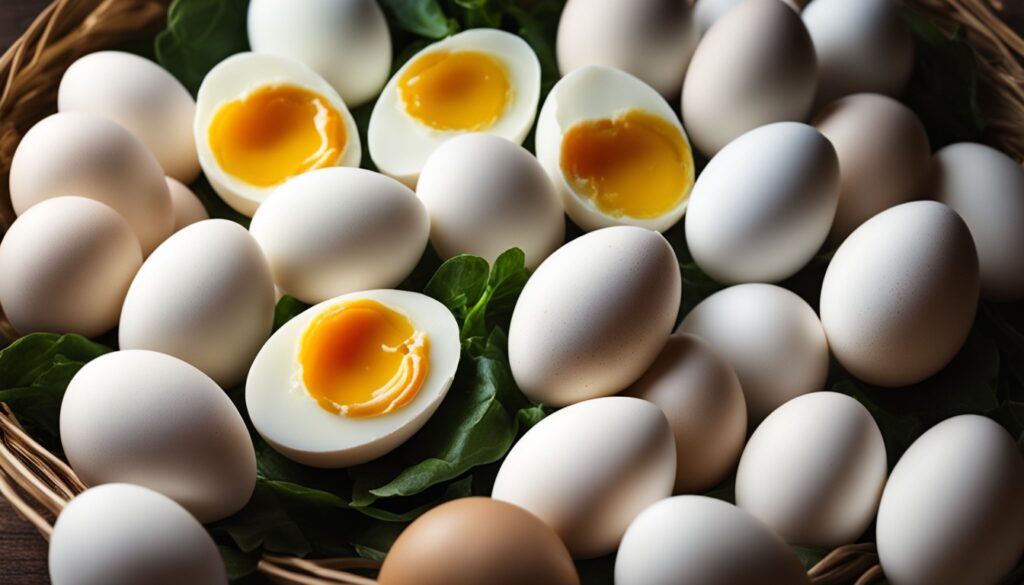
Eggs are packed with protein and biotin, making them key for hair growth. Protein is crucial for hair, as follicles mainly need it. Not getting enough protein can lead to hair loss. Biotin helps your body make a protein called keratin for hair, so it’s good for hair growth.
But, not many people lack biotin if they eat well. Along with these, eggs bring in zinc, selenium, and other nutrients vital for great hair. That’s why they are a top choice for a diet meant to keep your hair at its best.
| Nutrient | Benefits for Hair | Sources |
|---|---|---|
| Protein | Supports hair growth and prevents hair loss | Eggs, meat, fish, beans, nuts, seeds |
| Biotin | Promotes keratin production for stronger, healthier hair | Eggs, salmon, sweet potatoes, almonds, avocados |
| Zinc | Aids the hair growth and repair cycle | Oysters, beef, pumpkin seeds, cashews |
| Selenium | Helps protect hair follicles from oxidative damage | Eggs, Brazil nuts, tuna, sardines |
Adding eggs to your meals ensures you get a mix of protein, biotin, zinc, and selenium. These nutrients are key for vibrant, strong hair growth.
Berries: Antioxidants for Hair Follicle Protection
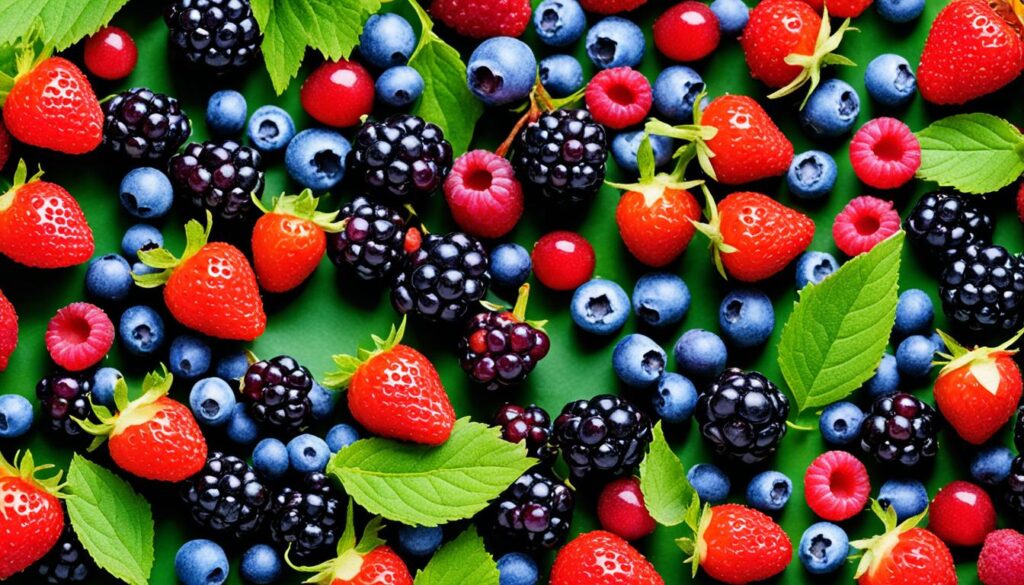
Berries are full of good stuff that might help hair grow. They have vitamin C, which fights off bad stuff in the body. These bad things, called free radicals, can harm hair follicles. Vitamin C boosts the making of collagen. This protein makes hair strong and stops it from breaking.
Vitamin C and Collagen Production
Vitamin C helps the body take in iron from food. Low iron can lead to losing hair. Eating just one cup of strawberries gives you nearly double the daily vitamin C you need.
Strawberries: A Rich Source of Vitamin C
Berries are a top source of antioxidants and vitamin C. Both help keep hair healthy and protect your hair follicles. Adding berries, like nutrient-packed strawberries, to what you eat is easy and fun. It can help keep your hair looking its best.
Spinach: A Nutritional Goldmine for Hair
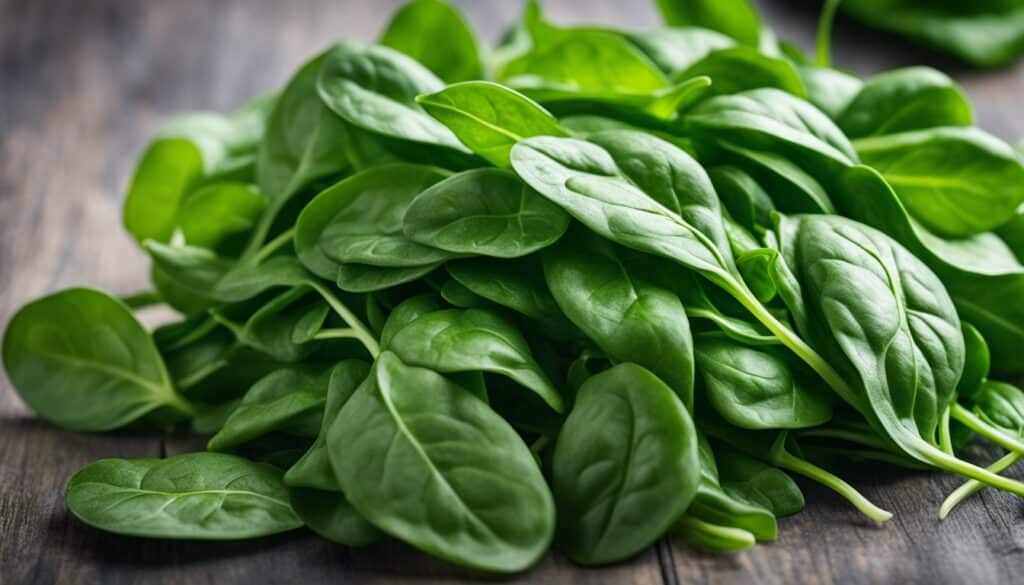
Spinach is a vital green veggie that boosts your hair’s health. It has folate, iron, and vitamins A and C. These nutrients are key for growing your hair. It’s been found that vitamin A is crucial for hair growth. But, too much of it can actually cause your hair to fall out. Eating foods rich in vitamin A, like spinach, is the best way to go.
Vitamin A and Its Role in Hair Growth
Vitamin A is pivotal in the hair growth process. It controls sebum, the oil that keeps your hair from drying out. This vitamin also helps hair cells develop well, which is needed for strong and healthy hair.
Iron: Essential for Oxygen Delivery
Spinach serves as a top source of plant-based iron, vital for growing hair. Iron helps carry oxygen by red blood cells around your body. This oxygen fuels your body’s growth work. Without enough iron, the hair growth cycle can get thrown off and hair follicles don’t get all the nutrients they need.
Spinach is not just good for iron and vitamin A. It’s also packed with vitamin C and folate. Vitamin C boosts collagen, making your hair stronger. Folate is essential for cell growth and division, an important step for healthy hair.
Eating spinach and similar greens can help your hair a lot. They provide the necessary vitamins and minerals. This is critical for strong, healthy hair and to avoid hair loss.
Fatty Fish: Omega-3s and Vitamin D
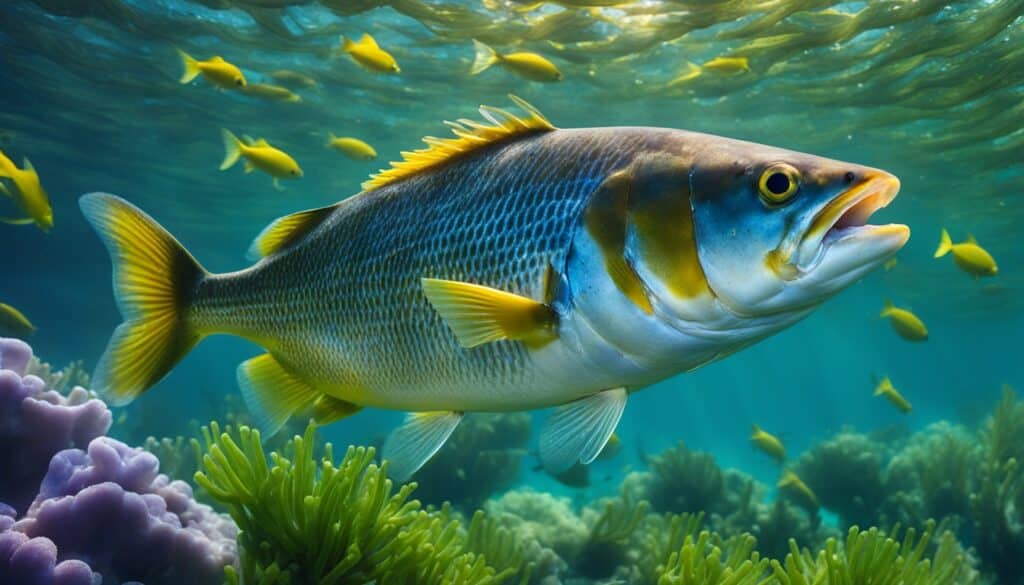
Fatty fish, like salmon and mackerel, are great for your hair. They are full of nutrients, especially omega-3 fatty acids. These nutrients help keep your hair healthy and may reduce hair loss.
Benefits of Omega-3 Fatty Acids
A study once combined omega-3 and omega-6 with antioxidants. The result was less hair loss and more hair. So, eating fish rich in omega-3 can help your hair stay thick and strong.
Vitamin D and Hair Cycle Regulation
Fatty fish are a top source of vitamin D3, which is key for your hair’s health. Some research shows not getting enough vitamin D might lead to hair loss. Adding fish to your meals can improve your hair’s condition.
Sweet Potatoes: Beta-Carotene for Vitamin A
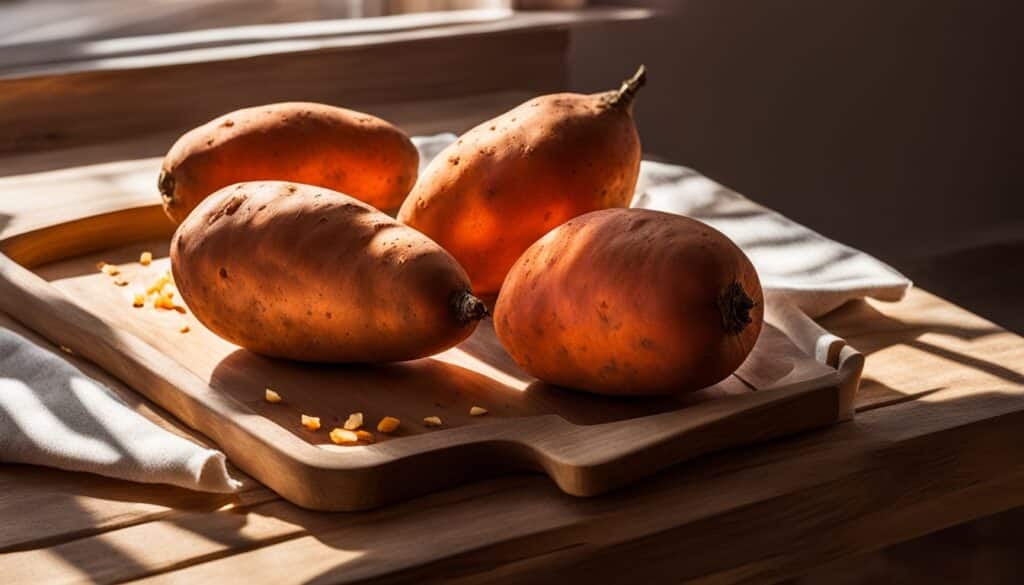
Sweet potatoes are a rich source of beta-carotene, a nutrient our bodies turn into vitamin A. Studies show vitamin A is vital for healthy hair. It affects the body’s natural oil, called sebum, keeping hair moist. Without enough vitamin A, hair loss might happen since it’s key for hair growth.
But, getting too much vitamin A could also lead to hair loss. The goal is to find balance. You should get your vitamin A from natural sources like sweet potatoes. This is better than taking too many supplements. Adding sweet potatoes to your diet can help keep your hair healthy. Plus, it aids in avoiding issues related to hair loss that come from bad sebum production.
Avocados: Healthy Fats and Vitamin E
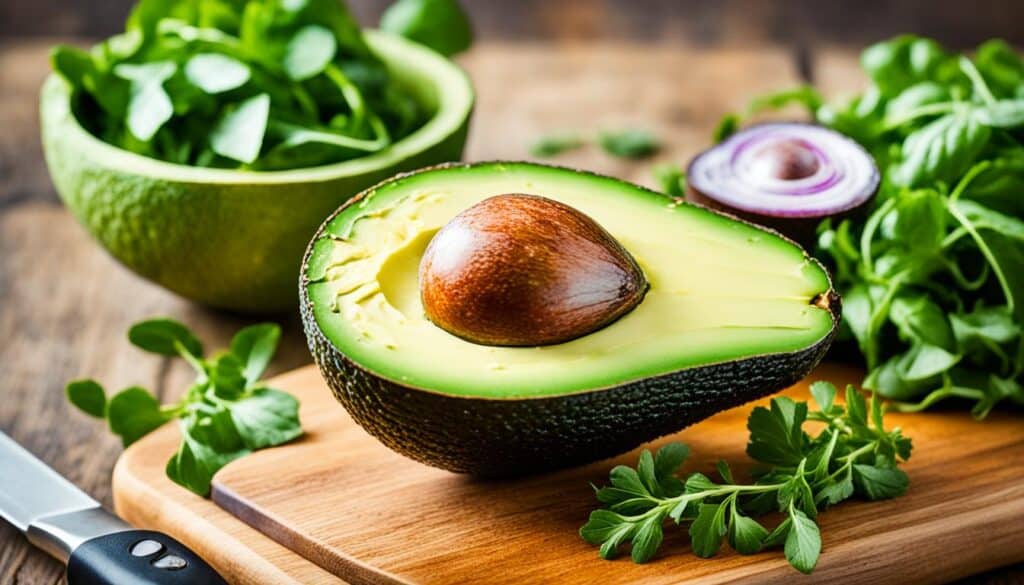
Avocados offer healthy fats and vitamin E, both great for your hair. Vitamin E stops harm from free radicals as an antioxidant. People losing hair tend to have less vitamin E. One study showed a 34.5% increase in hair growth after taking vitamin E for 8 months.
The Antioxidant Power of Vitamin E
Vitamin E guards against skin damage, such as to the scalp, preventing weak hair and fewer follicles. Shunning oxidative stress, vitamin E paves the way for a healthier scalp and better hair growth.
Promoting Scalp Health
The healthy fats in avocados are a boost for scalp health. Loaded with monounsaturated and polyunsaturated fats, they feed the scalp and follicles. The result is stronger hair that breaks and sheds less often.
Nuts and Seeds: Nutrient Powerhouses
Nuts and seeds are a key source of nutrients for hair growth. They contain vitamin E, B vitamins, zinc, selenium, and omega-3 fatty acids. One ounce of almonds meets 48% of your daily vitamin E need. Eating nuts is also tied to less inflammation, which is good for preventing hair loss.
Vitamin E and B Vitamins for Hair Growth
Vitamin E defends hair follicles as an antioxidant. It shields them from damage. B vitamins support the hair growth cycle. They include biotin, niacin, and pantothenic acid. These vitamins are good for strong hair.
Omega-3 Fatty Acids from Flaxseeds and Chia Seeds
Seeds such as flaxseeds and chia seeds are rich in omega-3 fatty acids. These are great for hair health and growth. Omega-3s lessen inflammation, which is connected to hair loss.
Eating various nuts and seeds regularly offers the best nutrient mix for hair growth.
Foods For Healthy Hair Growth
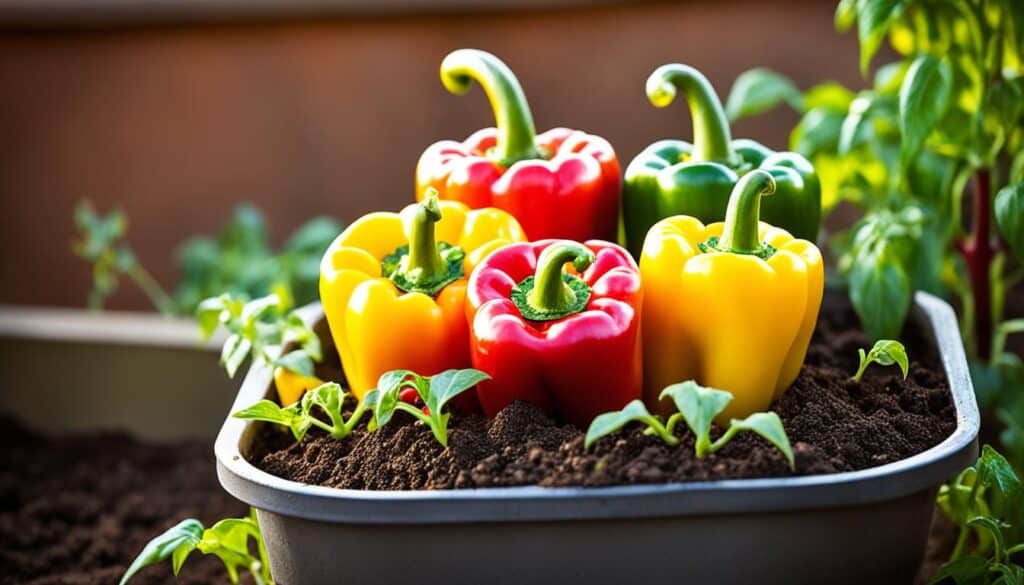
Sweet Peppers: Vitamin C and Vitamin A
Sweet peppers are rich in vitamin C, which is great for hair. Vitamin C boosts collagen production. This makes hair stronger. It’s also a top antioxidant. This keeps hair safe from oxidative stress.
Hair loss and gray hair can come from oxidative stress. This happens when free radicals are too many for the body’s defenses. Sweet peppers are also full of vitamin A. This vitamin is crucial for new hair and helps keep it healthy by affecting sebum production.
Oxidative Stress and Hair Loss
When free radicals outnumber antioxidants, it leads to oxidative stress. This has been linked to different types of hair loss, including androgenetic alopecia and telogen effluvium. Antioxidants in sweet peppers can fight these damaging radicals. This could lead to healthier hair growth.
Oysters: A Zinc-Rich Superfood
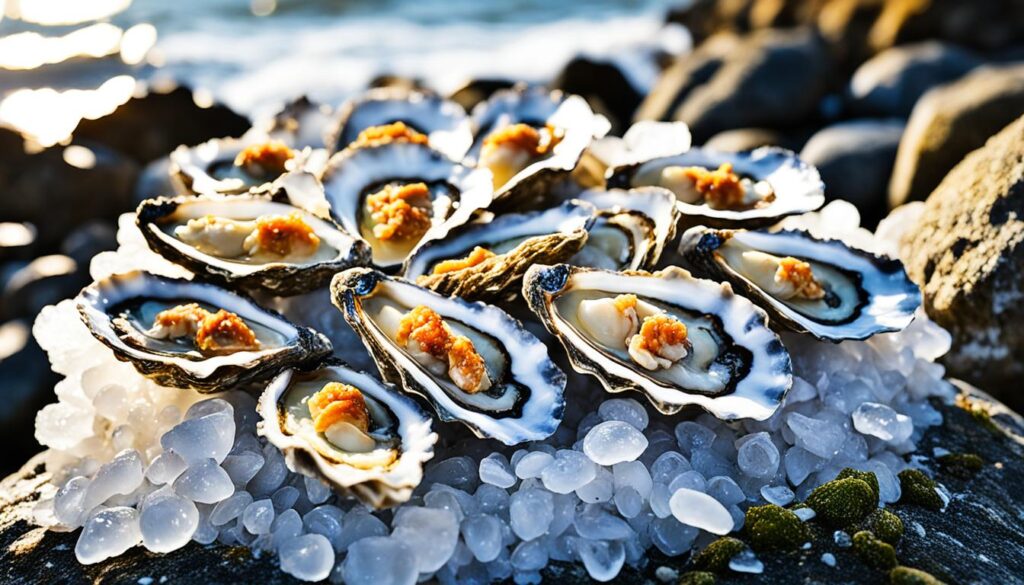
Oysters are full of zinc, making them great for boosting hair growth and hair repair. Zinc is needed for healthy hair follicles, which make new hair.
The Role of Zinc in Hair Growth and Repair
Lack of zinc in your diet can lead to telogen effluvium. This is a type of hair loss that’s common but reversible. Zinc is crucial for supporting how hair grows and repairs. Without enough zinc, hair might not grow well, becoming thin or falling out.
Avoiding Zinc Deficiency
For hair loss from not enough zinc, a zinc supplement can help. But, too much zinc can be harmful. That’s why eating foods rich in zinc, like oysters, is a safer choice. Oysters give you the right amount of zinc the body needs without overdoing it.
Beans: Plant-Based Protein and Zinc
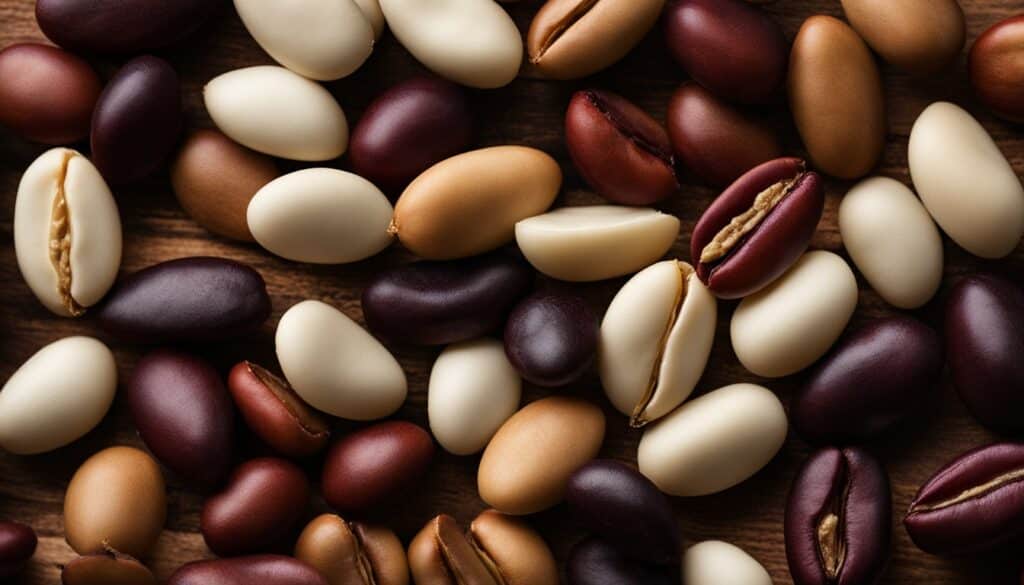
Beans provide an important plant-based protein for our bodies. This protein boosts hair growth. When you don’t get enough protein, you could lose hair. This is because some people lack certain types of protein when they’re losing hair. Foods like lentils have a lot of protein, even more than two large eggs.
The Importance of Protein for Hair Growth
Protein is key for keeping your hair strong and growing. When your diet lacks protein, your hair might get thin or weak. It’s crucial to get enough protein, whether it’s from beans, meat, or eggs. This keeps your hair growth healthy, your hair structure strong, and your hair color bright.
Zinc and Its Benefits for Hair
Beans also offer zinc, which is great for your hair. A lack of zinc could lead to hair loss. People with androgenetic alopecia tend to have less zinc. Zinc is essential for the health of your hair follicles. It helps with hair growth and keeps your hair from falling out too soon.
Soybeans: The Power of Spermidine
Research shows that spermidine in soybeans can help with hair growth. Spermidine is a lot in soybeans. A study proved that taking a spermidine-based supplement could make hair follicles grow longer.
Prolonging the Anagen Phase
The active growth stage of hair is called the anagen phase. Nutrients that can make this phase last longer might enhance hair growth. Spermidine found in soybeans does just that, leading to potentially stronger hair that’s also longer.
Other Hair-Boosting Compounds in Soybeans
Soybeans have more than just spermidine. They also have compounds that fight damage and inflammation in hair follicles. This helps keep the scalp healthy and supports good hair growth.
Also Read: What Is the Impact of Stress on Heart Health?
Conclusion
A balanced diet is key for healthy hair growth. Foods such as eggs, berries, and spinach supply essential nutrients. These include vitamins, minerals, proteins, and healthy fats.
Eating right protects your hair from damage and supports growth. It can prevent many types of hair loss. Key nutrients for hair health are biotin, omega-3 fatty acids, and protein.
Healthy hair starts with what you eat. Fuel your body with the right foods for strong, shiny hair. Include superfoods like eggs and nuts regularly in your meals. This will help you enjoy your hair looking and feeling great.
FAQs
What are the best nutritional foods for healthy hair growth?
To grow healthy hair, eat foods filled with vitamins, minerals, and good fats. These include eggs, berries, spinach, and fatty fish. Also, sweet potatoes, avocados, nuts, and seeds boost hair growth. Don’t forget soybeans, beans, sweet peppers, and oysters.
How do nutrient deficiencies affect hair loss?
Vitamins B12, D, biotin, riboflavin, and iron are crucial for hair. Lack of these can cause hair loss. Eating a balanced diet ensures you get these nutrients. This is crucial for hair growth, especially if your diet is lacking.
What role do vitamins, minerals, and protein play in hair growth?
Vitamins, minerals, and protein are key for healthy hair. They help in the growth cycle and keep cells turning over. They support keratin production and make the hair stronger. Plus, they bring oxygen and nutrients to the scalp.
How do eggs benefit hair growth?
Eggs are rich in protein and biotin, which are vital for your hair. Protein helps your hair follicles and biotin is essential for keratin. Keratin is what makes up your hair.
What antioxidants in berries can support hair growth?
Berries have vitamin C, which makes collagen and strengthens your hair. This vitamin also helps your body absorb iron. Berries’ antioxidants defend hair from free radical damage.
How does spinach promote healthy hair?
Spinach holds nutrients like folate, iron, and vitamins A and C that your hair needs. Vitamin A supports sebum production. Hair stays healthy with enough iron because it helps oxygen reach your hair.
What benefits do fatty fish provide for hair?
Fatty fish, including salmon and mackerel, are full of omega-3s. These fatty acids may boost your hair growth. They also have protein, selenium, vitamin D3, and B vitamins. These are all vital for healthy hair.
How do sweet potatoes support hair health?
Sweet potatoes help by giving your body beta-carotene. Your body changes this into vitamin A. Sebum keeps your hair healthy but too much vitamin A can make you lose hair.
What nutrients in avocados can promote hair growth?
Avocados are a great source of vitamin E and healthy fats. Vitamin E is a strong antioxidant. It fights off damage from free radicals on your scalp, supporting hair growth.
How can nuts and seeds benefit hair health?
Nuts and seeds are jam-packed with nutrients that help your hair grow. They have vitamin E, B vitamins, zinc, and more. These nutrients battle inflammation and keep your hair healthy.
What vitamins and minerals do sweet peppers provide for hair?
Sweet peppers offer lots of vitamin C, which boosts collagen for your hair. They also provide vitamin A. This vitamin is crucial for hair growth and sebum production.
How does zinc in oysters support hair growth?
Oysters are loaded with zinc, a key mineral for your hair’s growth and repair. Not getting enough zinc could cause hair loss.
What benefits do beans provide for hair health?
Beans are a top plant-based protein source, which your hair needs to grow. They also give you zinc, vital for hair’s growth and repair. Low protein or zinc can lead to hair loss.
How do soybeans promote hair growth?
Soybeans have spermidine, which might make hair grow longer. They also guard hair from damage and inflammation with other compounds they contain.
Source Links
- https://www.healthline.com/nutrition/foods-for-hair-growth
- https://www.webmd.com/skin-problems-and-treatments/hair-loss/eat-right-healthy-hair
- https://www.health.com/foods-for-hair-growth-7963750


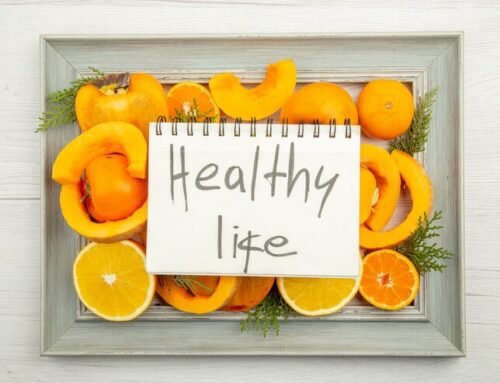



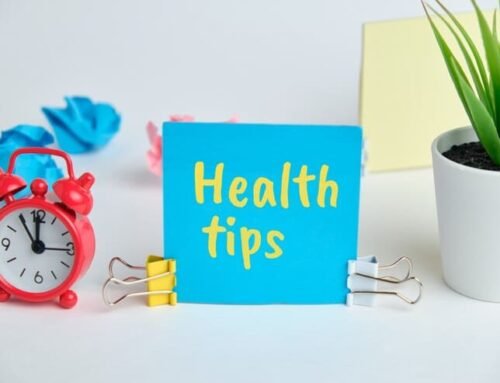
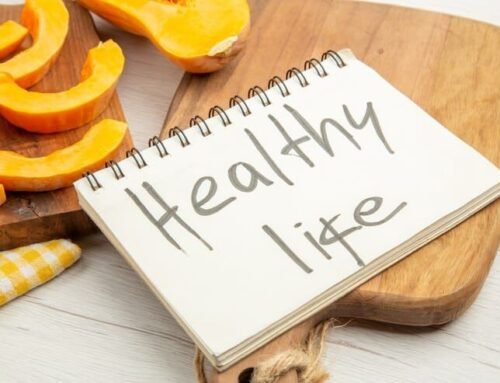
Leave A Comment